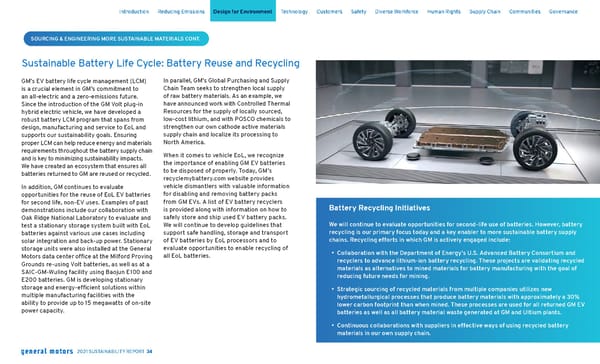SOURCING SUSTAINABLE MATERIALS CONT. SOURCING & ENGINEERING MORE SUSTAINABLE MATERIALS CONT. Sustainable Battery Life Cycle: Battery Reuse and Recycling GM’s EV battery life cycle management (LCM) is a crucial element in GM’s commitment to an all-electric and a zero-emissions future. Since the introduction of the GM Volt plug-in hybrid electric vehicle, we have developed a robust battery LCM program that spans from design, manufacturing and service to EoL and supports our sustainability goals. Ensuring proper LCM can help reduce energy and materials requirements throughout the battery supply chain and is key to minimizing sustainability impacts. We have created an ecosystem that ensures all batteries returned to GM are reused or recycled. In addition, GM continues to evaluate opportunities for the reuse of EoL EV batteries for second life, non-EV uses. Examples of past demonstrations include our collaboration with Oak Ridge National Laboratory to evaluate and test a stationary storage system built with EoL batteries against various use cases including solar integration and back-up power. Stationary storage units were also installed at the General Motors data center office at the Milford Proving Grounds re-using Volt batteries, as well as at a SAIC-GM-Wuling facility using Baojun E100 and E200 batteries. GM is developing stationary storage and energy-efficient solutions within multiple manufacturing facilities with the ability to provide up to 15 megawatts of on-site power capacity. In parallel, GM’s Global Purchasing and Supply Chain Team seeks to strengthen local supply of raw battery materials. As an example, we have announced work with Controlled Thermal Resources for the supply of locally sourced, low-cost lithium, and with POSCO chemicals to strengthen our own cathode active materials supply chain and localize its processing to North America. When it comes to vehicle EoL, we recognize the importance of enabling GM EV batteries to be disposed of properly. Today, GM’s recyclemybattery.com website provides vehicle dismantlers with valuable information for disabling and removing battery packs from GM EVs. A list of EV battery recyclers is provided along with information on how to safely store and ship used EV battery packs. We will continue to develop guidelines that support safe handling, storage and transport of EV batteries by EoL processors and to evaluate opportunities to enable recycling of all EoL batteries. Battery Recycling Initiatives We will continue to evaluate opportunities for second-life use of batteries. However, battery recycling is our primary focus today and a key enabler to more sustainable battery supply chains. Recycling efforts in which GM is actively engaged include: • Collaboration with the Department of Energy’s U.S. Advanced Battery Consortium and recyclers to advance lithium-ion battery recycling. These projects are validating recycled materials as alternatives to mined materials for battery manufacturing with the goal of reducing future needs for mining. • Strategic sourcing of recycled materials from multiple companies utilizes new hydrometallurgical processes that produce battery materials with approximately a 30% lower carbon footprint than when mined. These processes are used for all returned GM EV batteries as well as all battery material waste generated at GM and Ultium plants. • Continuous collaborations with suppliers in effective ways of using recycled battery materials in our own supply chain. Skip Navigation Introduction Reducing Emissions Design for Environment Technology Customers Safety Diverse Workforce Human Rights Supply Chain Communities Governance 2021 SUSTAINABILITY REPORT 34
 General Motors Sustainability Report Page 34 Page 36
General Motors Sustainability Report Page 34 Page 36